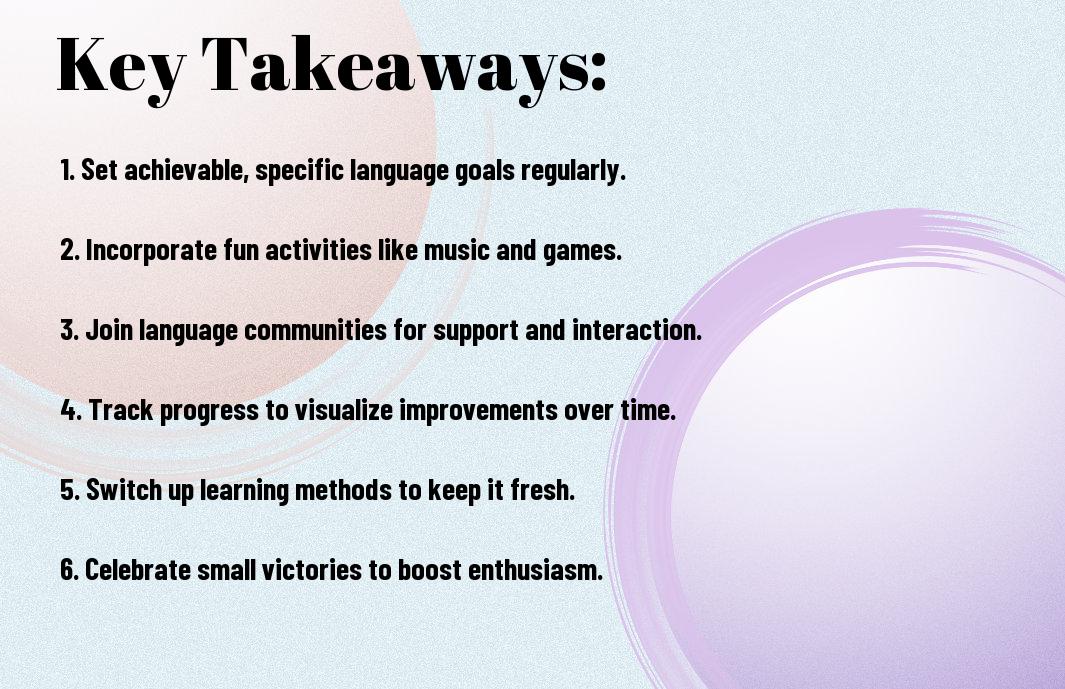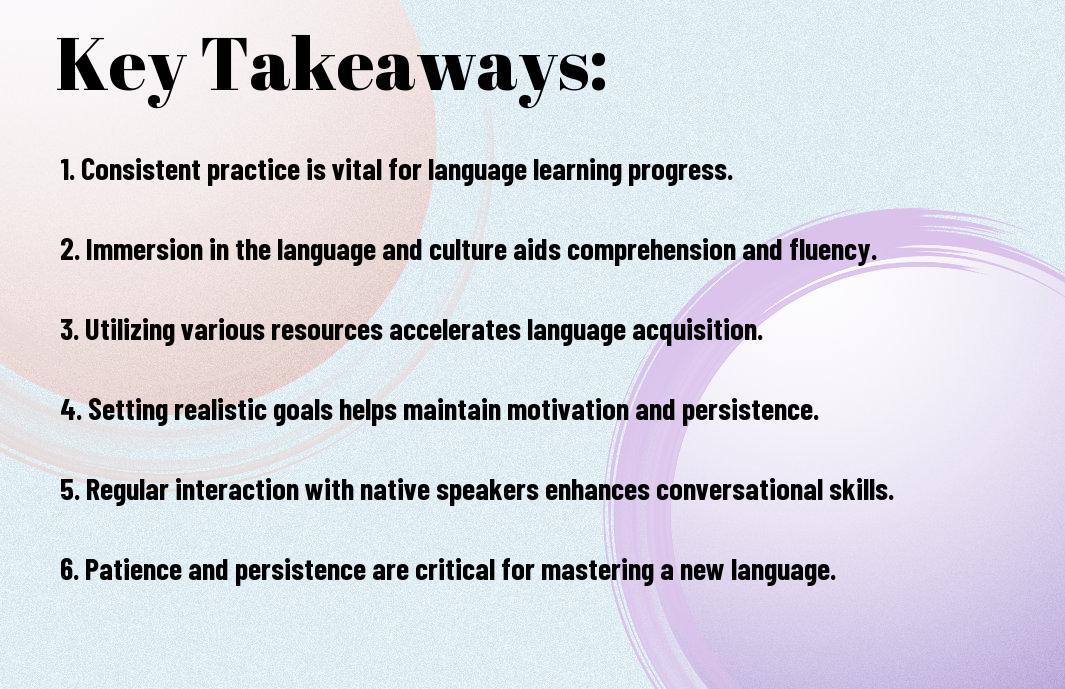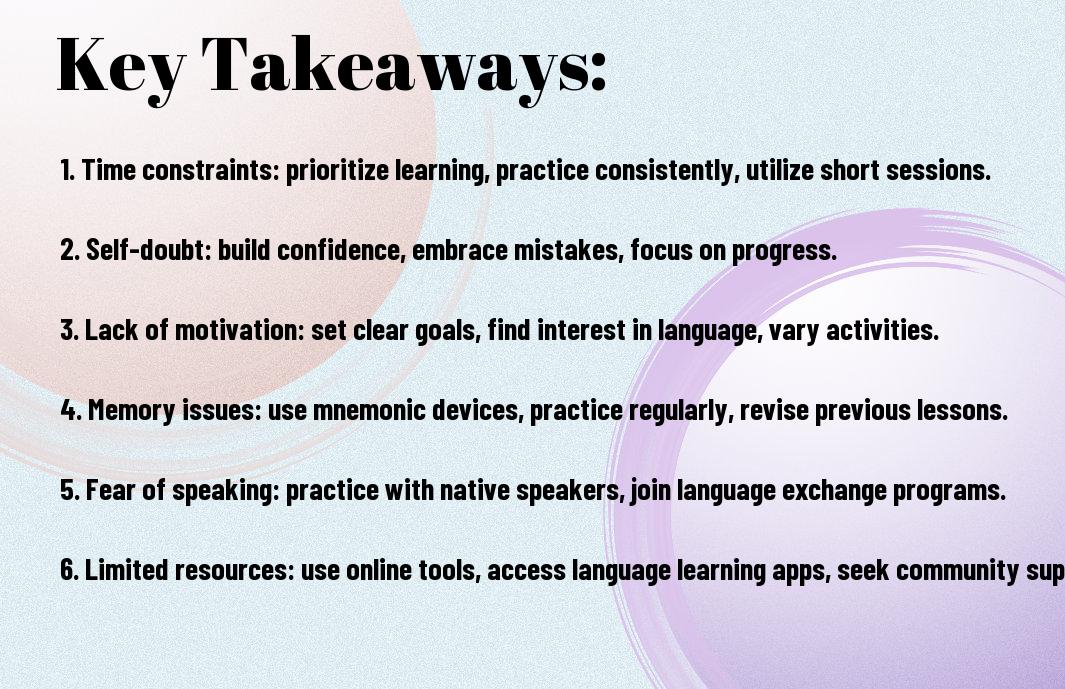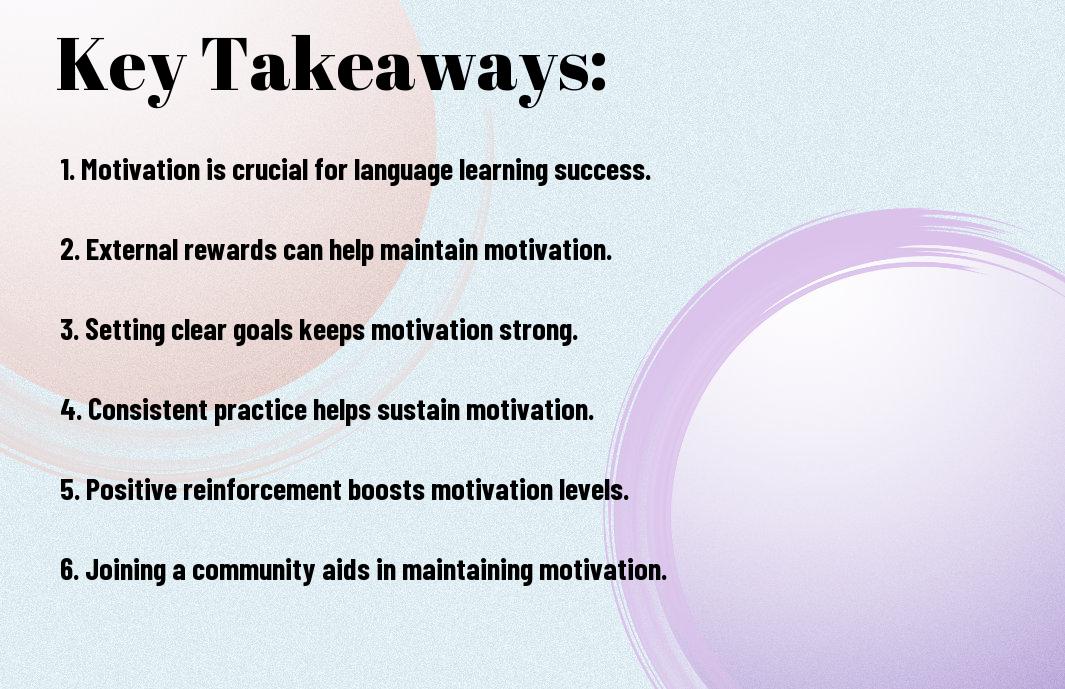As you initiate on your language learning journey, you’ll likely encounter ups and downs that can impact your motivation. To help you stay on track, you can explore strategies that foster a positive and productive mindset. Visit 7 Unbeatable Tips That Will Fire up Your Motivation to Learn a New Language for expert advice. By implementing these techniques, you can maintain your enthusiasm and achieve your language learning goals, taking your skills to the next level.

Key Takeaways:
To stay motivated while learning a language, consider the following points:
- Set achievable goals and break them down into smaller, manageable tasks to maintain a sense of progress and accomplishment.
- Create a study schedule and stick to it, ensuring consistent practice and routine in your language learning journey.
- Find a language learning community or partner to practice with, providing support and accountability to help you stay motivated.
- Use various resources such as language learning apps, books, and media to keep your learning experience engaging and fun.
- Focus on understanding and enjoying the language, rather than just grammar rules, to maintain a positive and motivated attitude towards learning.
Setting Language Learning Goals
The first step in staying motivated while learning a language is to set clear and achievable goals. You need to define what you want to accomplish and by when, whether it’s passing a language proficiency test or being able to hold conversations with native speakers.
Defining Your Motivation
Linguistically, your motivation for learning a language will drive your progress and determination. You should identify why you want to learn the language and what benefits it will bring to your personal and professional life, helping you to stay focused and motivated.
Creating a Study Schedule
Around your daily routine, you should plan out when and how you will study the language, setting aside dedicated time for practice and review, and making sure it fits with your lifestyle and commitments.
With a well-planned study schedule, you can make steady progress and track your improvement, which will help to boost your confidence and motivation, as you see yourself getting closer to your language learning goals, and you will be able to adjust your schedule as needed to stay on track and avoid burnout.
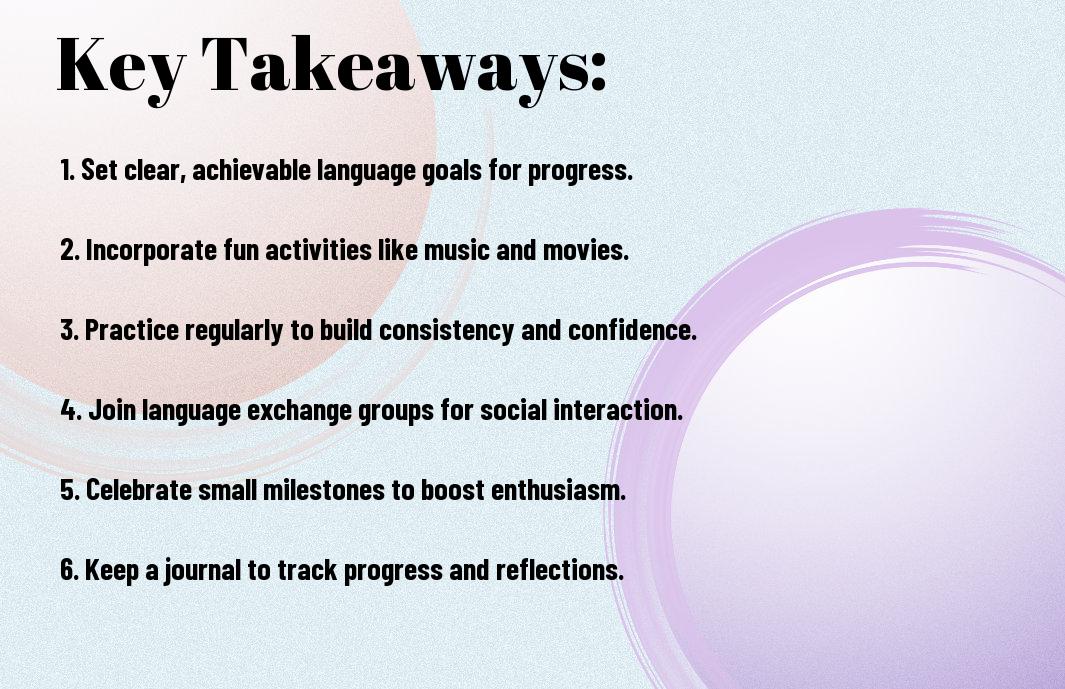
Building a Language Learning Routine
Some of the most successful language learners swear by the power of routine. By incorporating language learning into your daily schedule, you can make steady progress and stay motivated. Consistency is key when it comes to language learning, and having a set routine helps you stay on track.
Establishing a Daily Study Habit
Around the same time each day, set aside a specific time to study and stick to it. You will find that your brain adjusts to this new habit and you will be more focused during your study sessions. This daily habit will help you stay committed to your language learning goals.
Using Language Learning Apps and Resources
Above all, utilizing the right tools can make a significant difference in your language learning journey. You can explore various language learning apps, podcasts, and online resources to find what works best for you. These tools can provide you with interactive lessons, quizzes, and exercises to help you practice your language skills.
In fact, many language learning apps offer personalized lessons, progress tracking, and feedback, which can help you identify areas where you need improvement. You can use these apps to practice speaking, writing, listening, and reading in your target language, and you can even connect with native speakers or language exchange partners to practice your conversation skills. This will help you stay engaged and motivated throughout your language learning journey.
Overcoming Language Learning Obstacles
After encountering obstacles, you may feel discouraged, but it’s important to push through and find ways to overcome them to continue your language learning journey.
Dealing with Self-Doubt and Frustration
To tackle self-doubt and frustration, you need to take a step back, assess your progress, and adjust your approach to better suit your needs and goals, allowing you to regain confidence in your abilities.
Finding a Language Learning Community
Learning from others and sharing your experiences can be highly beneficial, so you should seek out a language learning community where you can connect with fellow learners and native speakers to enhance your language skills.
Language exchange websites, social media groups, and local language meetups are all great resources for you to find a community that fits your interests and learning style, providing you with opportunities to practice your language skills and stay motivated through interaction and support from like-minded individuals.
Staying Motivated with Rewards and Incentives
All language learners face moments of frustration, but with the right motivation, you can overcome these challenges and stay on track with your goals.
Setting Achievable Milestones and Rewards
Incentivizing your progress with rewards can be an excellent way to boost your motivation, as you set achievable milestones and treat yourself to something nice when you reach them, which helps you stay focused on your goals and celebrate small victories along the way.
Celebrating Progress and Reflection
Beyond the rewards, taking time to reflect on your progress is vital, as you evaluate your achievements and identify areas for improvement, allowing you to adjust your strategy and stay motivated.
Further, celebrating your progress, no matter how small, helps you see how far you’ve come and makes you more confident in your ability to reach your language learning goals, which in turn motivates you to continue learning and improving your language skills, as you take pride in your accomplishments and look forward to achieving more.
Immersing Yourself in the Language
Unlike traditional learning methods, immersing yourself in the language can be an effective way to stay motivated. You can find helpful tips on How To Motivate Yourself To Learn a New Language to enhance your learning experience.
Listening to Native Speakers and Music
Against all odds, listening to native speakers and music in the target language can help you develop your ear and get used to the rhythm and melody of the language.
Reading and Watching Language-Based Media
Meanwhile, media such as TV shows, movies, and books can provide you with a more engaging way to learn the language, making it more enjoyable and interactive.
Listening to podcasts, audiobooks, or watching TV shows and movies with subtitles in the target language can help you improve your comprehension and get exposed to different accents and speaking styles, making your learning experience more diverse and fun, and you can apply this knowledge to your daily conversations, enabling you to communicate more effectively.
Seeking Help and Support
Now, when learning a language, you may encounter setbacks, and it’s crucial to know how to overcome them. You can find helpful tips on How to Overcome the Motivation Dip in Language Learning to stay on track.
Finding a Language Exchange Partner
Any language learner can benefit from practicing with a native speaker. You can find language exchange partners online or in language meetups, which will help you improve your speaking skills and get feedback on your progress.
Working with a Language Tutor or Coach
Behind every successful language learner is often a great tutor or coach. You can work with a language tutor or coach who will create a personalized learning plan tailored to your needs and goals, helping you to achieve fluency faster.
Plus, working with a language tutor or coach provides you with additional support and motivation, as you will have regular check-ins and progress tracking, which will help you stay motivated and focused on your language learning journey, allowing you to overcome obstacles and achieve your goals more efficiently.
To wrap up
Taking this into account, you can maintain your motivation while learning a language by setting achievable goals and tracking your progress. You will stay motivated if you celebrate your small victories and continually challenge yourself. Your learning journey will be more enjoyable if you find a study buddy or join a language learning community, helping you to stay engaged and motivated throughout the process.
FAQ
Q: What are some effective ways to stay motivated while learning a language?
A: Staying motivated while learning a language can be challenging, but there are several strategies that can help. Setting achievable goals, both short-term and long-term, can provide a sense of direction and accomplishment. Additionally, finding a language learning buddy or joining a language exchange program can offer moral support and encourage consistent practice. Immersing oneself in the language by watching TV shows or movies, listening to music, and reading books in the target language can also make the learning process more enjoyable and engaging.
Q: How can I avoid burnout and maintain a consistent language learning routine?
A: To avoid burnout, it’s important to pace yourself and not overload your study schedule. Breaking down study sessions into manageable chunks, focusing on different aspects of the language such as grammar, vocabulary, and pronunciation, can help maintain a balanced routine. Taking regular breaks, rewarding yourself for milestones achieved, and mixing up study materials can also help keep the learning process fresh and prevent boredom. Moreover, incorporating language learning into daily activities, such as using flashcards during commutes or practicing with a language learning app during free time, can make the process feel less like a chore.
Q: What role does feedback play in staying motivated during the language learning process?
A: Feedback is a significant motivator in language learning. Receiving constructive feedback on pronunciation, grammar, and vocabulary usage can help learners identify areas for improvement and track their progress. This can be achieved through regular assessments, language exchange conversations, or working with a tutor who provides personalized feedback. Furthermore, self-assessment and reflection on one’s own learning process can offer insights into what works best for the individual, allowing for adjustments to be made to keep the learning journey engaging and rewarding. Positive reinforcement, whether from oneself or others, can significantly boost motivation and encourage continued effort in language learning.
